
Blood Memory
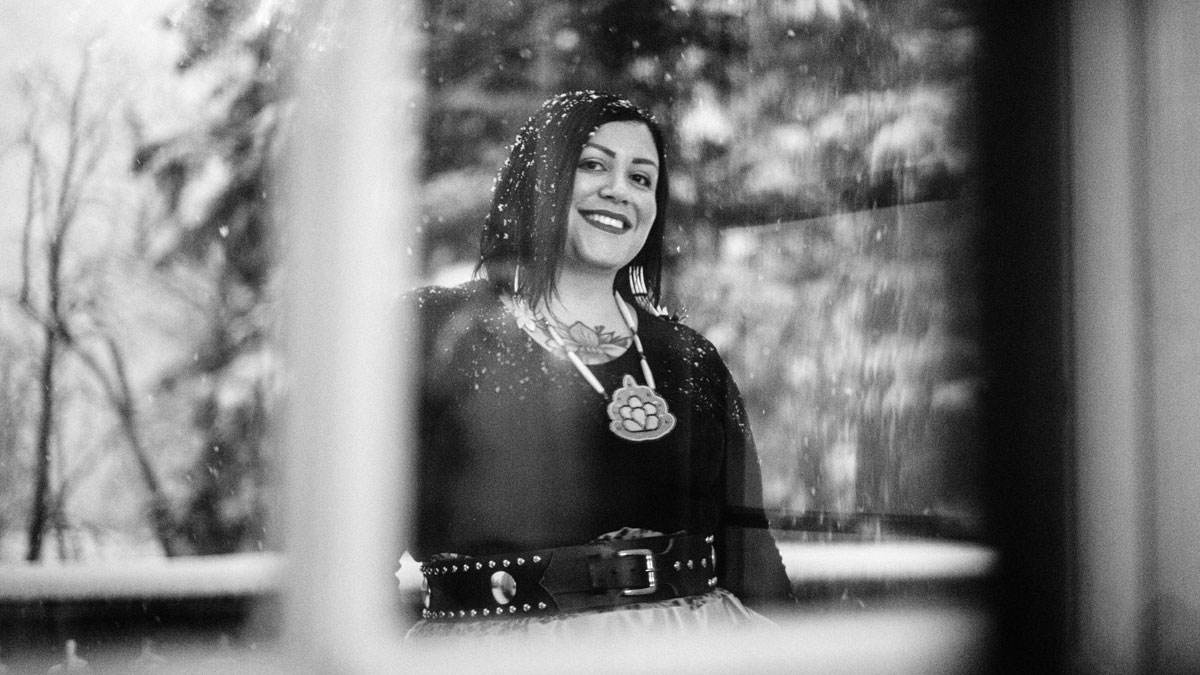
Salzburg Global Seminar, with support from the Bush Foundation and the McKnight Foundation, is proud to host at Schloss Leopoldskron artist residencies from selected Fellows from the Cultural Innovators Forum, a program that since 2013 has brought together cultural innovators and creative practitioners from around the world.
Artist and Fellow Adrienne Benjamin spent eight days at Schloss Leopoldskron toward the end of 2022, connecting with people from all over the world.
My residency in Salzburg was intensely fruitful. It brought forth realizations for me in my life and in my art that I truly never could have seen coming.
I was originally part of the 2018 class of Young Cultural Innovators who had the opportunity to visit Schloss Leopoldskron and build fellowship with culture workers and kindred spirits from around the world. I am so grateful to have been a part of that incredible group and am so proud of the growth and trajectory of each of the amazing artists since that time.
My first visit was different though, there was always someone to turn to, another American, and constant English language being spoken by other Young Cultural Innovators or by the support staff. We rarely ventured out of the Schloss and if we did, we “Americans” generally stuck together. I guess we kind of all felt out of place and understood our foreignness together, so it was comfortable. No one felt too worried about the language barrier because we had strength in numbers and that made things feel secure.
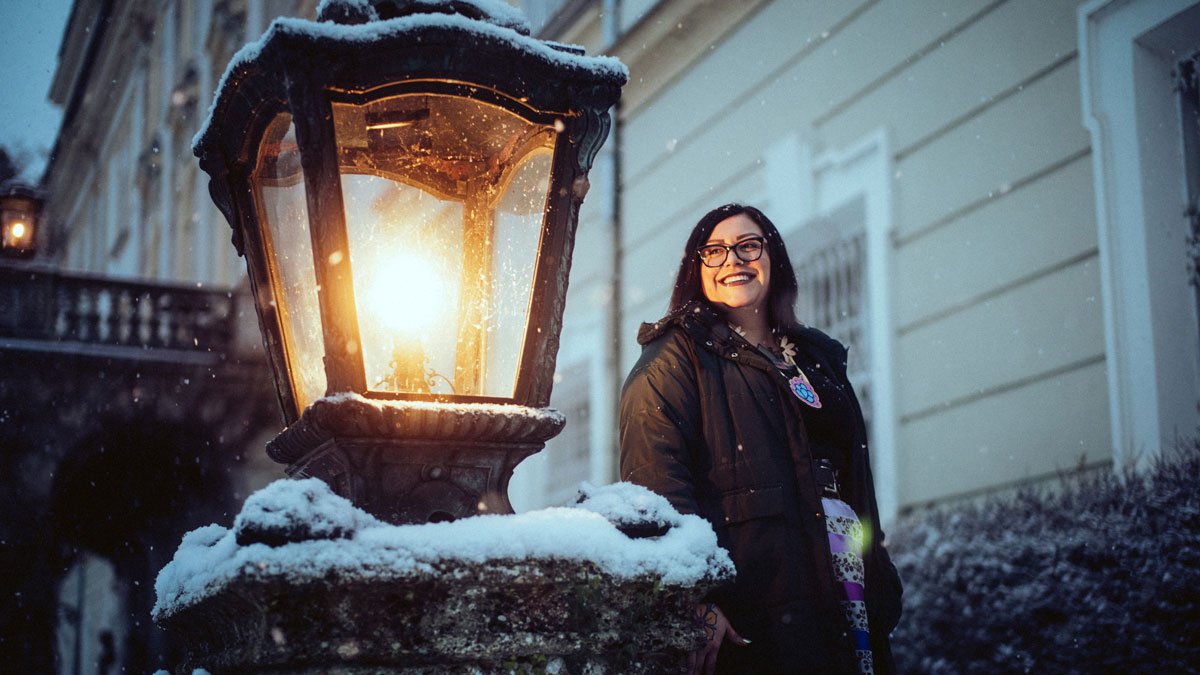
Fast forward to my visit this past December, a completely different experience. There was no group, and I chose to bring my thirteen-year-old daughter with me. I felt confident about the trip, as I had navigated Germany's Munich airport before, but when we got to the airport, out flight was delayed to Atlanta (our connection flight still in the United States). The airline rerouted us to Amsterdam, and then eventually on to Munich. When we reached Amsterdam, I found myself pleasantly surprised at the English I saw written and heard spoken in that airport. Soon enough we made it to Munich, and that’s when a little bit of Indigenous blood memory bubbled up for me.
Getting off the plane on the tarmac and being immediately bussed to the international arrivals section of the airport was an interesting experience. It felt like herding sheep and then getting your brands checked. We saw a man with dark skin getting hassled for his papers by the Munich Airport Police, the only man with dark skin in our group of passengers, and my daughter turned to ask, “Are they being racist? Is there racism here?” I explained to her that although we couldn’t understand what was happening because of the language difference, to people with our background as “Americans” and the things that we see daily, it could easily look that way. “Let’s just hope not,” I whispered.
From there, we got our bags and next on our list was to find the airport train terminal and get on a train to Salzburg. The man at the station looked exactly like the man at the train station from the old American Christmas classic “Frosty the Snowman”, down to the visor, vest, and glasses. I could even picture him saying, “No money, no ticket!” as he looked up angrily from below his visor. However, when he looked up at me angrily, he spoke in German. I just said, two tickets to Salzburg please. Moments later, he slid two tickets across his desk. I asked him where we go to catch the train and all he gave me was a quick point behind me to an escalator moving downward. I didn’t dare ask him anymore questions so off we went.
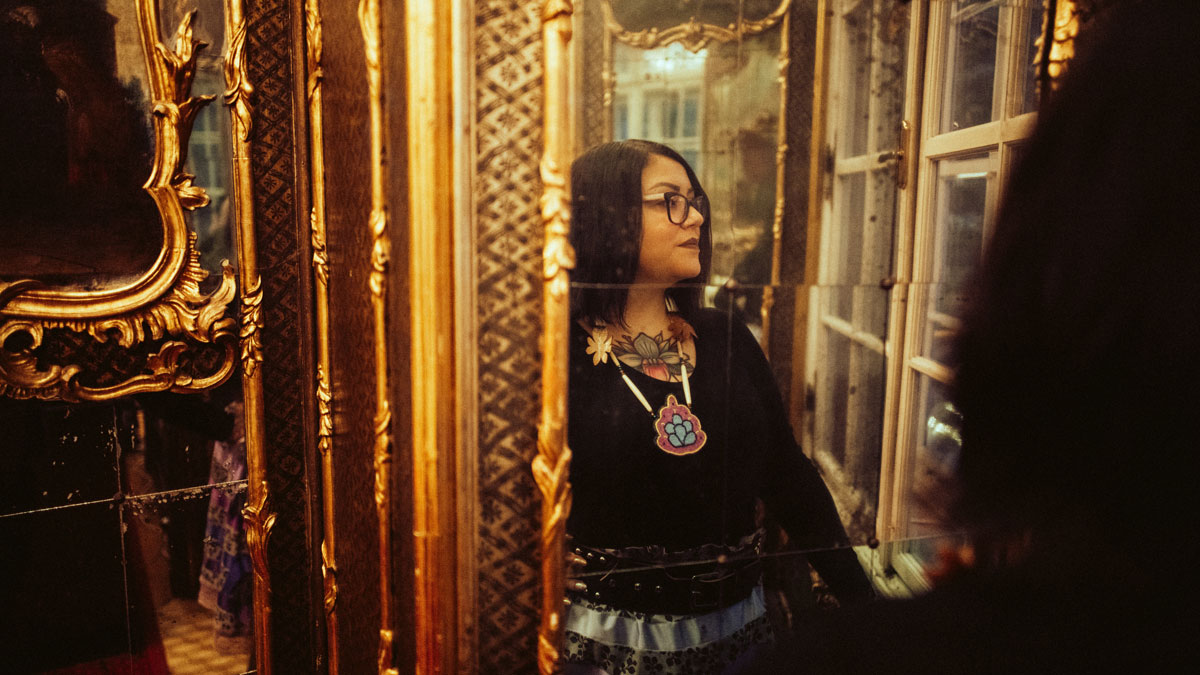
Once downstairs and on the train deck, I looked at my ticket and did my best Nancy Drew impression to figure out the train numbers. There were too many numbers and even more numbers when I looked up and around me on the platforms. If I didn’t have my daughter with me, I would have probably just sat down and cried. I felt overwhelmed. I connected it back to being bussed and herded and then watching that man be what visually looked like being harassed by people speaking a language that I couldn’t understand with huge guns. I forgot to mention that before, the airport police and every other officer I saw whether in Germany or Austria, all carried semi-automatic weapons in their hands or strapped on their bodies. Talk about intimidation. Maybe it should have made me feel safer I suppose, but instead I felt threatened, and after what we saw I worried about being a foreigner and saying or doing the wrong thing.
So back to the train platform, my daughter must have felt my vibe and she pointed out a help desk to our right. A woman had just turned on the light and sat herself on the chair in front of the window. I walked up and said, “English?” She shook her head yes, so I continued to ask her about which train I was supposed to get on and where. “Ostbahnhof” she said. Over and over, louder and louder. She started making hand gestures next. I’ve experienced this with my older daughter who has Cerebral Palsy and is non-verbal. People think that because of her condition, if they talk slower and louder, she will understand. She understands just fine, but there is an ugly assumption there. Fun fact: it’s demeaning and incredibly unnecessary. Finally, I respond, “Yes. Ostbahnhof, but what number is the train, and do I switch trains?’ Then she says this time, “Ostbahnhof 8, get off for Salzburg.” I was tired of being yelled at and now will never forget the name Ostbahnhof for as long as I live, so I just nodded politely and gave the thumbs up. A train pulled up and I looked to her for visual guidance, and she quickly pointed and shooed me to get onto the train that had just pulled up. My daughter and I just shrugged and committed to the adventure. Sure enough, we eventually get to a stop called Ostbahnhof and thanks to the help desk, know we need to change trains. We managed to find it and slept the rest of the way to Salzburg.
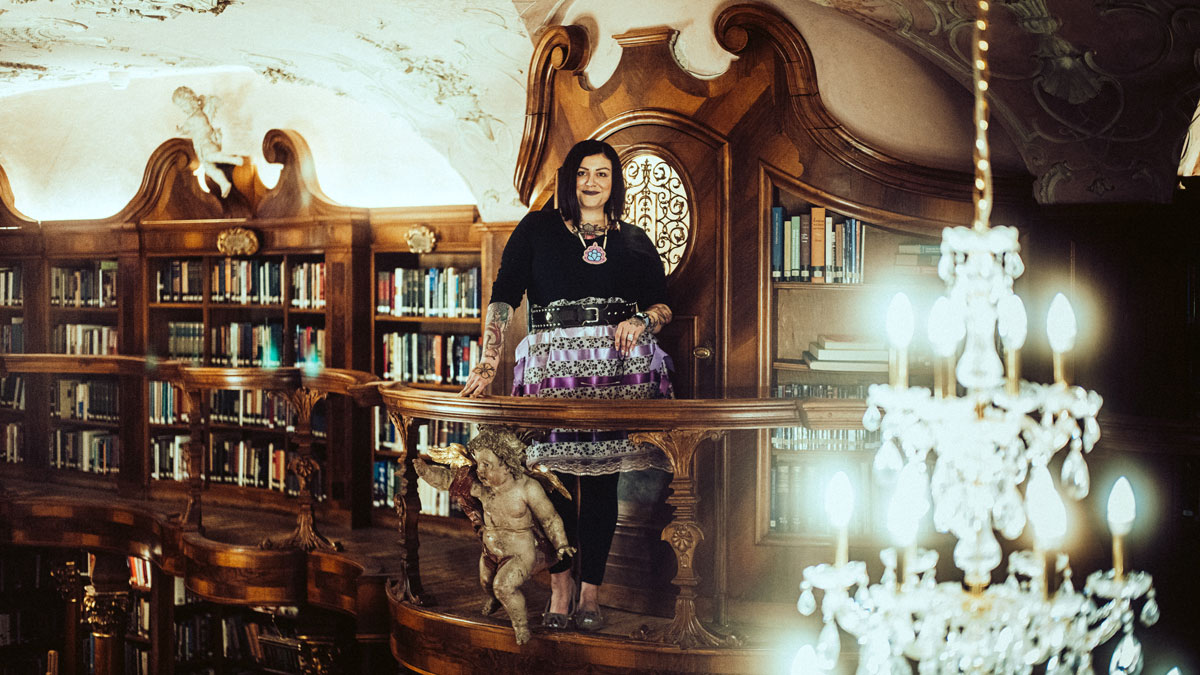
That night I immediately met up with the other artist resident, Moira Villiard, who also happens to be Anishinaabe (Native American) like myself and from the United States. We bonded immediately over our shared experience and the language barrier and what it had stirred up from the depths in both of us. It was a blessing to be able to unpack that experience so quickly with someone who could understand it.
In the time since my residency, I have told this story to friends, and I keep landing on the same realization. If there was ever an experience that could put you in a position to even have a bottom level understanding of what our Native American ancestors went through here in the United States and Canada during first colonial contact or in treaty signing, or in every other horrible experience that they had as scouts or tribal representatives during the formation of the United States, this language barrier experience was possibly it.
There was no way to know if someone would understand me, people were standing around in uniforms with huge machine guns with an intimidation factor of 100 herding us along, people looked at us funny, some even laughed when we spoke. They would watch us eat, they would stare, and some pointed. Every move was built on pure trust. Every move. You hoped each time that someone would speak English, or you immediately knew there might be problems.
It also gave me a heightened sense of disgust with the lack of multi-language learning here in the United States. My first Salzburg cab driver was incredibly kind, he spoke first in German, then easily transitioned to English once he heard me talk. He knew where Minnesota was in the United States and said he had friends there. Out of curiosity, I asked him how many languages he spoke, and he said, “German, Somali, English, Chinese, and a little bit of French.” That ticked something in me again. The language of my people; Ojibwemowin, in my little corner of the world, is beyond endangered. I’ve thought it too hard to learn, I’ve had too many other things to do, I’ve had to sometimes just survive and couldn’t think about it, and most time I had thought of every excuse, except to just learn it. It’s a language that has endured continued attempts of erasure by governments. I’ve always been told about how it was so important to carry on that language, and if I’m being honest, I only basically understood that, but I never felt it deep inside of me until I was here. Until I felt all the immense feelings of confusion, fear, belittling, and at some points forced comedy. I really do owe it to those ancestors to learn and speak my traditional language. It made me interested in even learning others, especially in my country of self-idealized superiority that only speaks one and expects the world to cater to them and to speak it too.
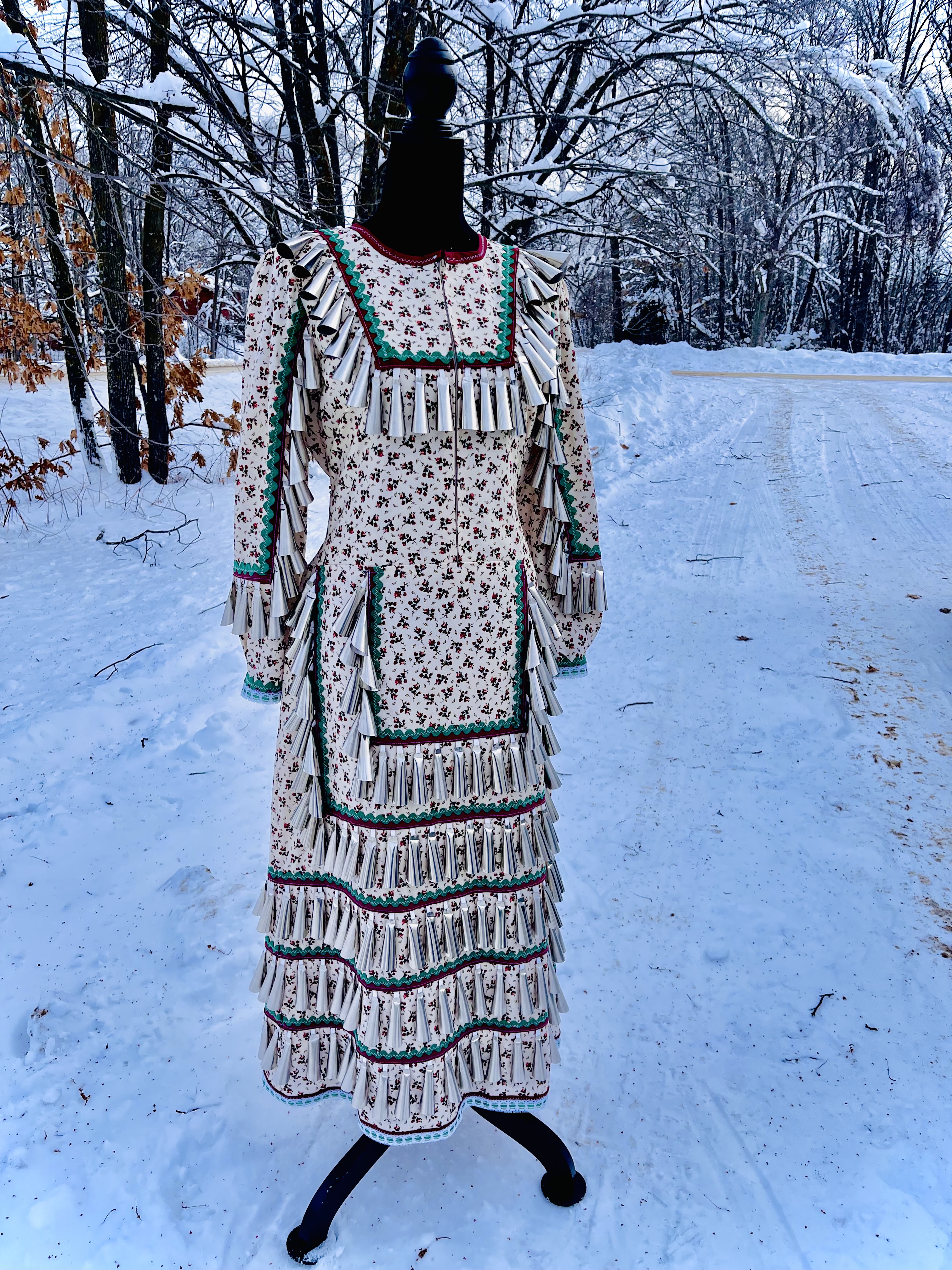
The second day in my room at the Schloss, I downloaded the Pimsleur and Rosetta Stone apps and started practicing Ojibwemowin. I’ve been continuing it since.
My art was also inspired by this trip and when I returned home, I created a jingle dress (Anishinaabe traditional regalia) inspired by the sights, sounds, and colors of Salzburg at Christmas.
Miigwech to the organizations that made this opportunity possible, it truly gave me so much vantage and deep meditational retrospect.